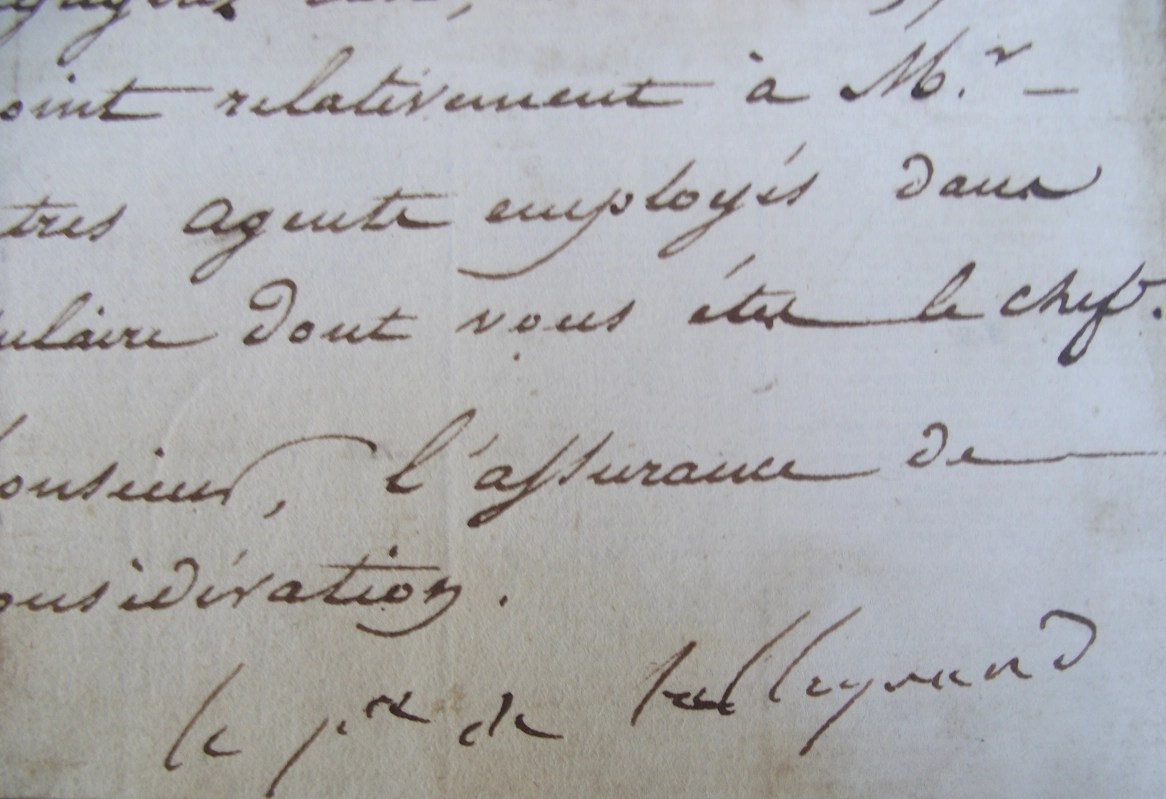
Description: Note hand-written and signed by Talleyrand ‘le père de Talleyrand’ (father Talleyrand) on a piece of paper which appears to be an old letter (remnants of text behind). The note states, that an important personality involved in the development of institutions of higher education in Paris should be followed and watched. This person advanced projects which were against Talleyrand’s own opinion on how the higher education should be organised.
Additional Info:
A rare, early handwritten note, which shows how Talleyrand wanted to be informed about everything happening around him. There are many signed pieces by him, especially forms or letters written by others in connection with his status as foreign minister. Handwritten text by himself is quite rare.
Charles Maurice de Talleyrand-Périgord (1754 – 1838)
Talleyrand was born into a leading aristocratic family in Paris. He was prince de Bénévent, then prince de Talleyrand and was a French diplomat. He was ordained a priest in 1779, when he was 25. Later he worked successfully at the highest level (usually as foreign minister) for the regime of Louis XVI, through several governments of the French Revolution and then for Napoleon I, Louis XVIII, Charles X and Louis – Philippe. Most of them distrusted Talleyrand but, like Napoleon, found him indispensable. The name ‘Talleyrand’ has become a synonym for crafty, cynical diplomacy.
He was Napoleon’s chief diplomatic aide in the conquest of Europe. Most of the time, however, he worked for peace so as to consolidate France’s gains. He succeeded in obtaining peace with Austria in the 1801 Treaty of Luneville and with Britain in the 1802 Treaty of Amiens. He could not stop the renewal of war in 1803. By 1805 he opposed his emperor’s renewed wars against Austria, Prussia, and Russia in 1805 -1806; he resigned as foreign minister in August 1807 but Napoleon still trusted him. Talleyrand connived to undermine Napoleon’s plans and secretly dealt with Tsar Alexander of Russia and the Austrian minister Metternich. He was seeking a negotiated secure peace so as to perpetuate the gains of the French Revolution. But Napoleon rejected peace and when he fell in 1814, Talleyrand took charge of the Bourbon restoration based on the principle of legitimacy. He played a major role at the Congress of Vienna in 1814-1815, where he negotiated a favourable settlement for France while undoing Napoleon’s conquests.
Talleyrand polarizes scholarly opinion. Some regard him as one of the most versatile, skilled and influential diplomats in European history, and some believe that he was a traitor, betraying in turn, the Ancien Régime, the French Revolution, Napoleon, and the Restoration.
Talleyrand was one of the best customers of Abraham – Louis Breguet, buying from him over 30 watches for himself and his influential entourage. One legend states, that Breguet introduced his newly invented ‘parachute’ shock protection during festivities at Talleyrand’s villa. Breguet took his watch out of his pocket and pretended to make it drop on the floor by accident. The audience around him was astonished that the watch still worked, which allowed Breguet to explain and market his new invention among the present wealthy aristocrats. Talleyrand apparently stated ‘Breguet that devil, this can only come from him’.

